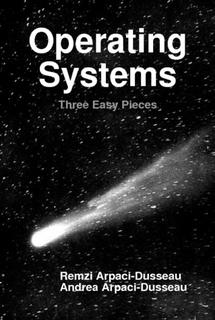This Is Not The Course Website You Are Looking For
This course website is from a previous semester. If you are currently in the class, please make sure you are viewing the latest course website instead of this old one.
Reading 12: Networking
Everyone:
Next week, we will discuss system calls involving networking. We will explore using sockets to communicate between clients and servers and eventually create our own HTTP client in the form of thor.
TL;DR¶
The focus of this reading is to explore system calls related to network sockets in C.

Readings¶
The readings for this week are:
-
Beej's Guide to Network Programming
You can skip the parts about datagram sockets and slightly advanced techniques.
Optional References¶
-
This has basic coverage of networking, along with some information about remote procedure calls (RPC) that you can skip.
Quiz¶
This week, the reading is split into two sections: the first part is a
dredd quiz, while the second part involves one C program: ncat.c.
To test the C program, you will need to download the Makefile and test scripts:
$ git checkout master # Make sure we are in master branch $ git pull --rebase # Make sure we are up-to-date with GitHub $ git checkout -b reading12 # Create reading12 branch and check it out $ mkdir reading12 # Create reading12 folder $ cd reading12 # Go into reading12 folder # Download Reading 12 Makefile $ curl -LO https://raw.githubusercontent.com/nd-cse-20289-sp21/cse-20289-sp21-assignments/master/reading12/Makefile # Download Starter code $ curl -LO https://raw.githubusercontent.com/nd-cse-20289-sp21/cse-20289-sp21-assignments/master/reading12/ncat.c # Download, build, and execute tests $ make test
Questions¶
Record the answers to the following Reading 12 Quiz questions in your
reading12 branch:
Programs¶
Given the provided Makefile and ncat.c, you are to do the following:
-
Modify Makefile to include a rule for the
ncatprogram. Be sure to use theCCandCFLAGSvariables in your rule.Once you have a working Makefile, you should be able to use the make command to run your recipes:
$ make clean # Remove targets rm -f ncat $ make # Build targets gcc -g -Wall -Werror -std=gnu99 -o ncat ncat.c
-
Modify ncat.c so that it uses system calls in C to implement the equivalent Python script:
#!/usr/bin/env python3 import socket import sys # Parse command line options try: HOST = sys.argv[1] PORT = int(sys.argv[2]) except IndexError: print("Usage: {} HOST PORT".format(sys.argv[0]), file=sys.stderr) sys.exit(1) # Create socket and connect to specified HOST and PORT try: csocket = socket.socket(socket.AF_INET, socket.SOCK_STREAM) csocket.connect((HOST, PORT)) cstream = csocket.makefile('w') except socket.error as e: print('Socket Error: {}'.format(e)) sys.exit(1) # Read from stdin and write to socket for line in sys.stdin: cstream.write(line) # Cleanup csocket.close()
This is basically a partial implementation of the nc command you have used
previously: given a HOST and PORT, the program creates a socket,
connects to the server, and then sends data from standard input to the
remote server via the socket connection.
Fill in the Blanks¶
The code has a few ____ placeholders. You will need to replace these
placeholders with the appropriate functions and variables to complete
the program.
Here is a list of some possible functions and variables you may wish to use:
AF_UNSPECSOCK_STREAMsocket_fdsocket_file- getaddrinfo
- gai_strerror
- socket
- close
- connect
- freeaddrinfo
- fdopen
- fclose
- fgets
- fputs
Once you have a working ncat.c, you should be able to build and run it:
$ make # Build ncat program gcc -g -Wall -Werror -std=gnu99 -o ncat ncat.c $ ./ncat # Usage Usage: ./ncat HOST PORT $ nc -l 9123 & # Start netcat server in background [1] 12532 $ date | ./ncat localhost 9123 # Send message to server Connected to localhost:9123 Sun Apr 15 16:50:38 EDT 2018 [1]+ Done nc -l -p 9123 $ ./ncat fakehost 9999 Could not look up fakehost:9999: Name or service not known $ ./ncat localhost 0 Unable to connect to localhost:0: Connection refused $ make clean # Cleanup rm -f ncat
Submission¶
To submit you work, follow the same process outlined in Reading 01:
$ git checkout master # Make sure we are in master branch $ git pull --rebase # Make sure we are up-to-date with GitHub $ git checkout -b reading12 # Create reading12 branch and check it out $ mkdir reading12 # Create reading12 folder $ cd reading12 # Go into reading12 folder $ $EDITOR answers.json # Edit your answers.json file $ ../.scripts/check.py # Check reading12 quiz Checking reading12 quiz ... Q1 0.25 Q2 0.75 Score 1.00 / 1.00 Status Success $ git add answers.json # Add answers.json to staging area $ git commit -m "Reading 12: Quiz" # Commit work $ $EDITOR ncat.c # Edit source code $ make test # Build and Run tests Testing ncat ... ncat (syscalls) ... Success ncat (usage, output) ... Success ncat (usage, valgrind) ... Success ncat (fakehost 9999, client) ... Success ncat (fakehost 9999, valgrind) ... Success ncat (localhost 0, client) ... Success ncat (localhost 0, valgrind) ... Success ncat (localhost 9770, client) ... Success ncat (localhost 9770, server) ... Success ncat (localhost 9770, valgrind) ... Success ncat (weasel.h4x0r.space 9110, client) ... Success ncat (weasel.h4x0r.space 9110, server) ... Success ncat (weasel.h4x0r.space 9110, valgrind) ... Success Score 3.00 $ git add Makefile # Add Makefile to staging area $ git add ncat.c # Add source code to staging area $ git commit -m "Reading 12: Code" # Commit work $ git push -u origin reading12 # Push branch to GitHub
Pull Request¶
Remember to create a Pull Request and assign the appropriate TA from the Reading 12 TA List.
DO NOT MERGE your own Pull Request. The TAs use open Pull Requests to keep track of which assignments to grade. Closing them yourself will cause a delay in grading and confuse the TAs.